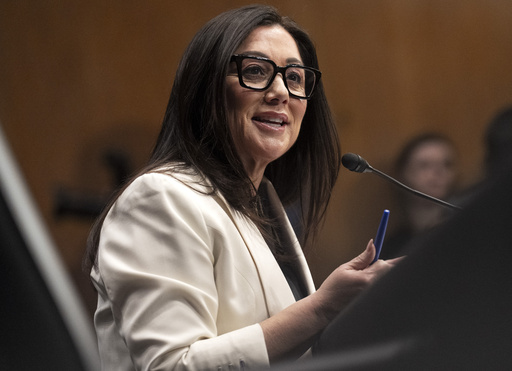NEW YORK — During a Senate committee hearing, Labor Secretary nominee Lori Chavez-DeRemer faced intense scrutiny on her past support for pro-union policies, her stance on increasing the federal minimum wage, and her ability to challenge President Donald Trump’s directives.
Democratic senators pressed Chavez-DeRemer for assurances regarding the safeguarding of sensitive data under the Department of Labor. Meanwhile, Republican members of the Senate Committee on Health, Education, Labor & Pensions questioned her continued support for legislation aimed at facilitating union organization among workers.
Chavez-DeRemer, who previously served as a Republican congresswoman from Oregon and held the office of mayor in a city near Portland known for its liberal leanings, has been characterized by union leaders as someone supportive of organized labor. However, advocates for workers’ rights express skepticism about her capacity to maintain that reputation during an administration that has enacted significant workforce reductions.
Vermont independent Bernie Sanders, in his opening statement, raised concerns about the potential authoritarian tendencies of the current leadership. He challenged Chavez-DeRemer by asking whether she would have the courage to confront the President if necessary, stating, “Will you have the courage to say, ‘Mr. President, that’s unconstitutional, that’s wrong?’”
Throughout the hearing, Chavez-DeRemer attempted to balance her historically pro-union stance with the current administration’s policies, often reiterating her responses or avoiding direct answers by emphasizing her departure from legislative roles. While acknowledging the stagnation of the federal minimum wage at $7.25 since 2009, she cautioned against taking measures that could have adverse effects on the economy.
Sen. Bill Cassidy, the Republican committee chair from Louisiana, expressed that Trump’s administration presented a unique chance to implement a pro-American agenda but noted business owners were wary of Chavez-DeRemer’s previous support for the Protecting the Right to Organize Act. During her initial remarks, she described it as “imperfect” and avoided confirming her support for the legislation when pressed by Cassidy.
She articulated that the role of the Labor Secretary is not to create laws but rather to support Congress in their legislative efforts. She also endorsed states’ “right to work” laws, which permit individuals to opt out of union membership, a point that contradicts a significant aspect of the PRO Act aimed at abolishing such laws.
In response to Sanders’ inquiry about her loyalty to the administration or the labor force, Chavez-DeRemer stated, “If confirmed, my job will be to implement President Trump’s policy vision,” emphasizing fairness for businesses and workers alike.
Political analysts speculate that Trump’s selection of Chavez-DeRemer for the Labor Secretary position may be a strategic move to connect with constituents aligned with labor groups.
In the event of confirmation, she would manage nearly 16,000 full-time employees within the Department of Labor, overseeing a budget proposal of $13.9 billion for the fiscal year 2025. Her decisions would significantly affect workers’ wages, unionization efforts, workplace safety, and employer rights concerning dismissals.
However, her influence may be challenged as the administration seeks to reduce governmental spending and workforce size. In his initial month, Trump froze substantial federal funding and initiated offers for buyouts to a majority of federal employees. Recently, his administration began terminating nearly all probationary staff who lacked civil service protections. Furthermore, Elon Musk, a billionaire heading the Department of Government Efficiency, has suggested eliminating entire agencies.
Adam Shah, director of national policy for Jobs with Justice, expressed concern that regardless of Chavez-DeRemer’s intentions, the influences within the Trump administration oriented towards dismantling institutions may undermine her effectiveness as Labor Secretary.
In January, Trump dismissed two of three Democratic commissioners from the Equal Employment Opportunity Commission, the federal entity responsible for workplace civil rights enforcement. Additionally, Gwynne Wilcox, the first Black woman to serve on the National Labor Relations Board, and General Counsel Jennifer Abruzzo were also removed by Trump. These firings have left these independent agencies unable to fulfill their mandates. When asked about the sufficiency of the EEOC and NLRB for executing their duties, Chavez-DeRemer affirmed that they should have adequate membership.
Senators also pressed for guarantees that Chavez-DeRemer would secure sensitive information, especially in light of Musk’s companies facing numerous OSHA investigations. When questioned if she would deny access to Musk or his representatives, she attributed the decision to Trump, stating, “I work for the president of the United States.”
Her response failed to satisfy Sen. Chris Murphy, who countered that she has the capacity to oppose the president and emphasized ethical decision-making. Chavez-DeRemer indicated she would consult with legal advisors at the Department of Labor and the White House regarding any such requests before reaching a conclusion.
Fourteen Democratic states have raised objections against Musk’s administration from accessing governmental data systems and participating in worker layoffs within the Department of Labor. A federal judge recently refused to issue a restraining order against this access.
During Wednesday’s testimony, Chavez-DeRemer remarked on Trump’s notable political achievements, particularly in securing support from working-class Americans and union members who typically aligned with Democrats.




